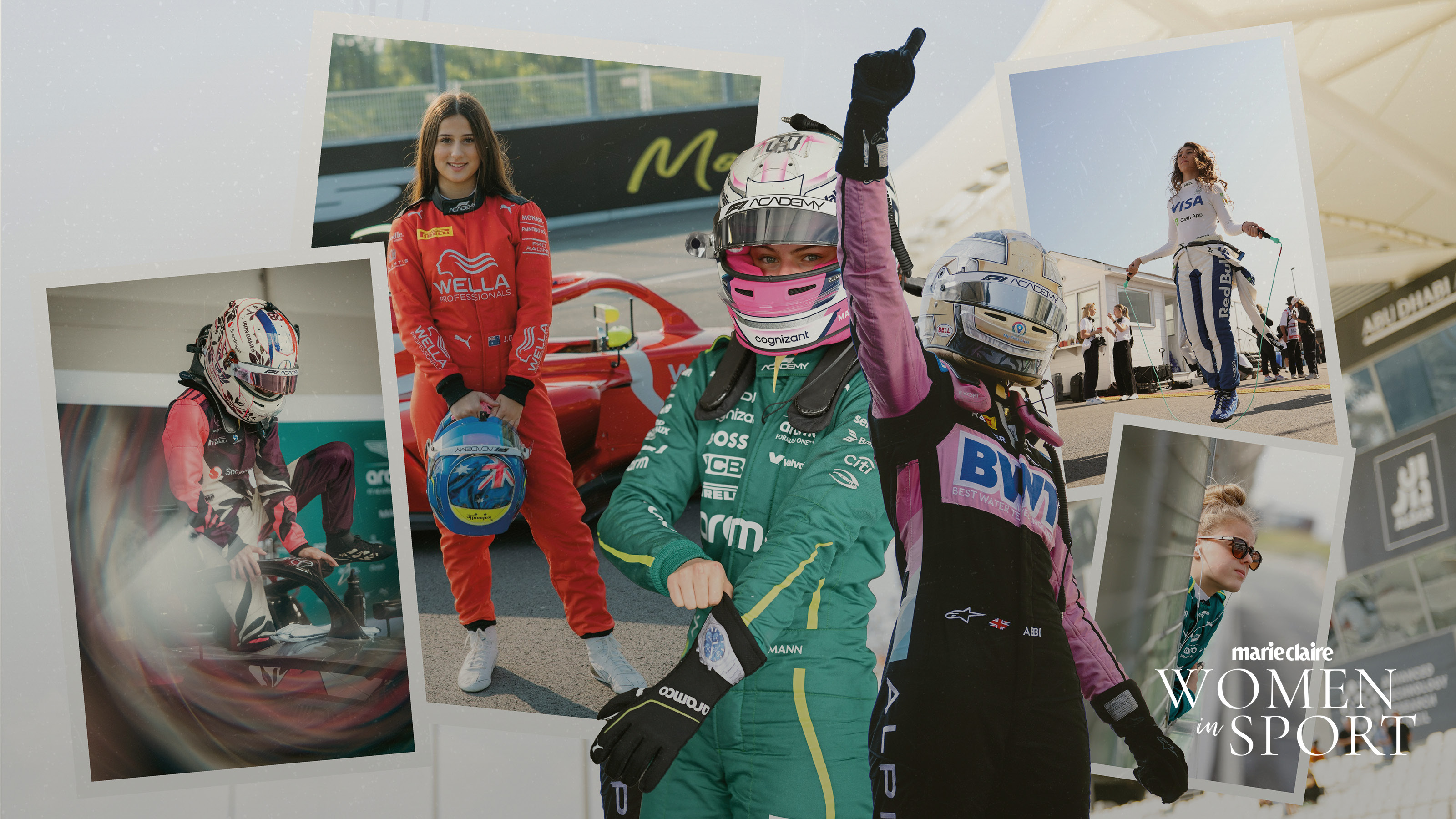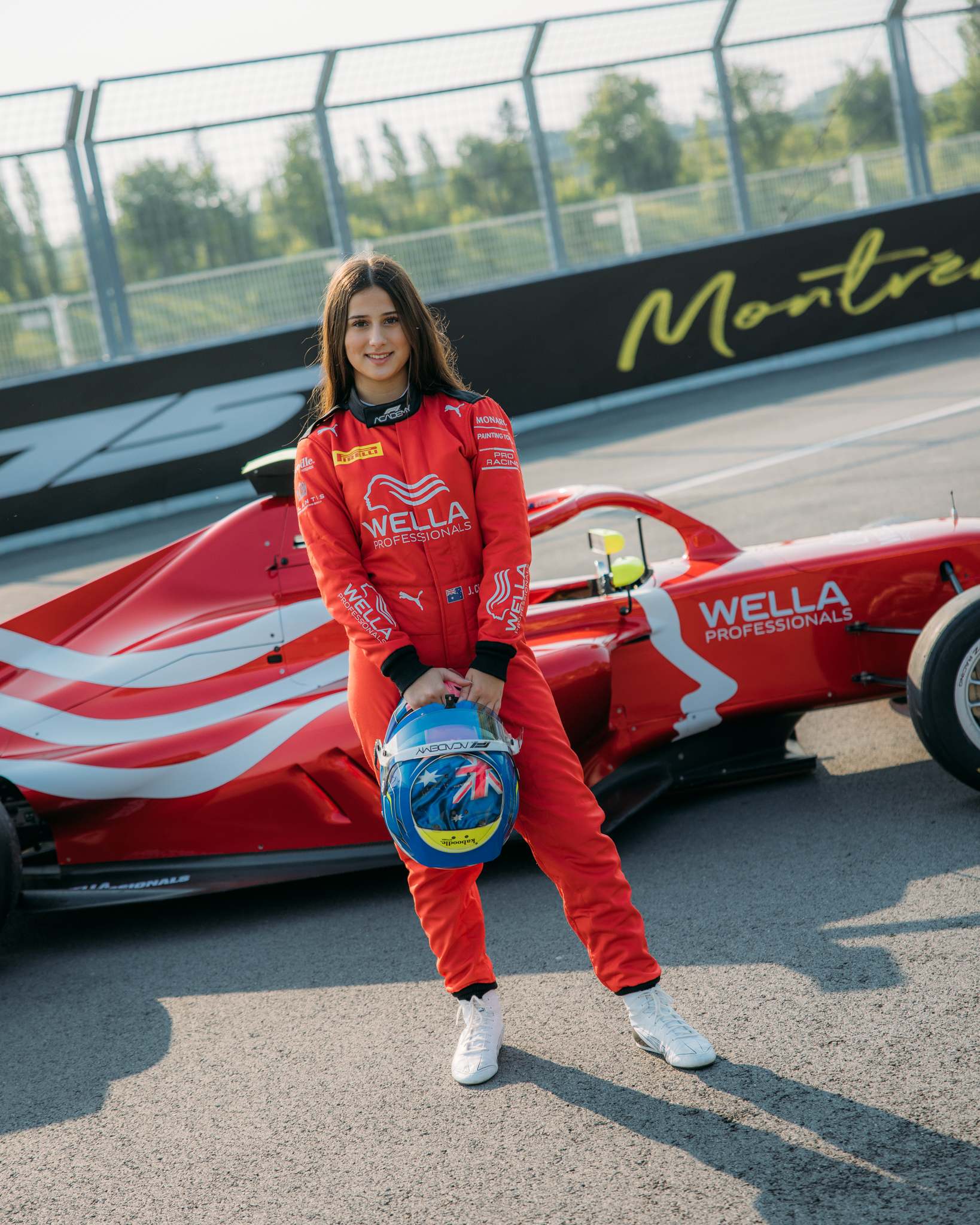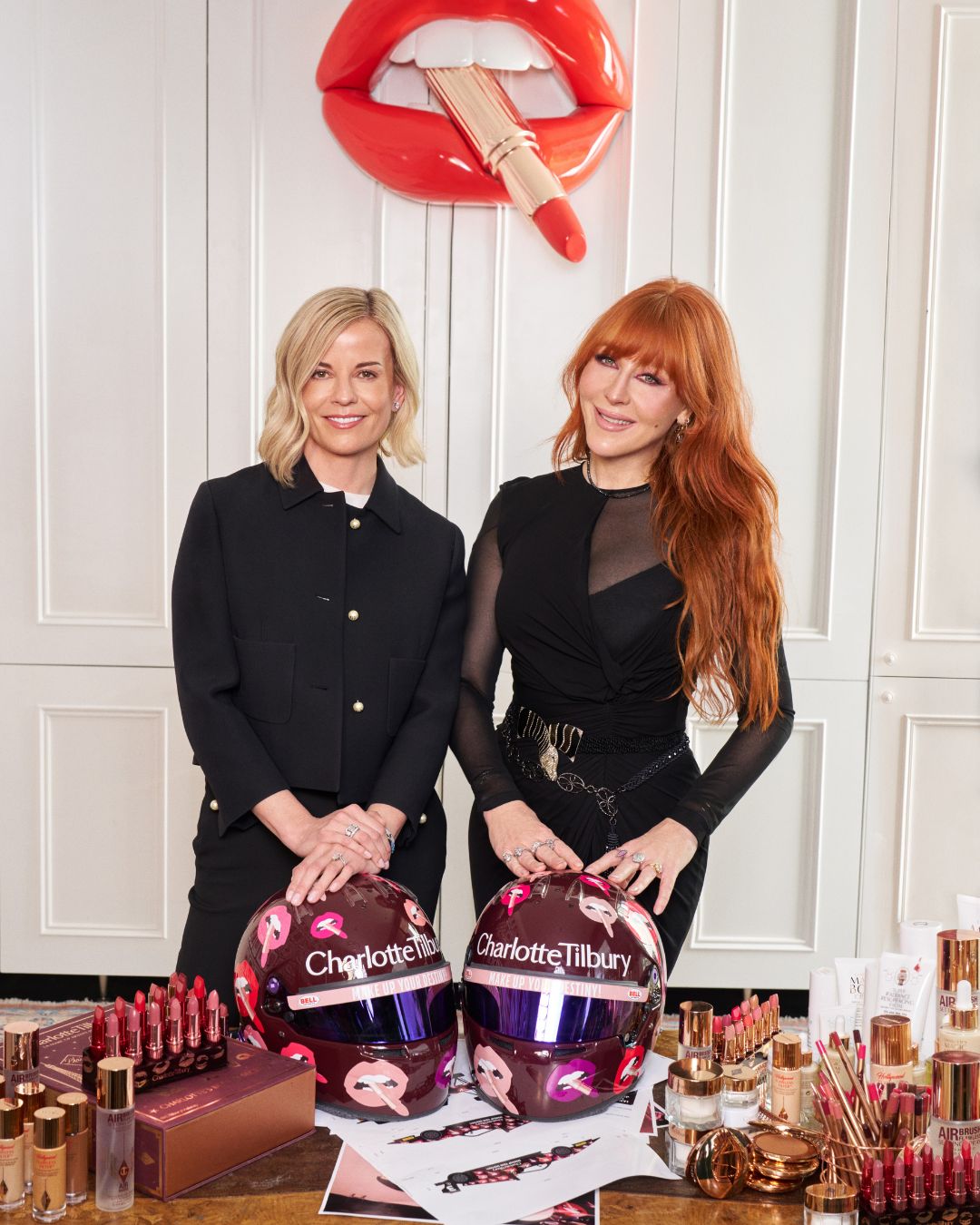40% of Formula 1 Fans Are Now Female - How 2025 Became A Transformative Year for Motorsport
As a world-first F1 sponsorship is announced, we meet the women changing the sport and inspiring a nation of fangirls.


Celebrity news, beauty, fashion advice, and fascinating features, delivered straight to your inbox!
You are now subscribed
Your newsletter sign-up was successful
As a lifetime F1 fan girl, it truly feels like the last twelve months have been transformative for motorsport. You probably won't need me to tell you that for over seven decades, there's been an obvious lack of gender equality in Formula One. Yes, there were women lining the pit lanes, eagerly watching engineers in the garages, or celebrities sipping champagne on a yacht around the iconic Monaco circuit. But it felt there was a real emptiness, almost as if women were intended to be there as some sort of "decoration". Seeing a female in a race team? Almost unheard of. As for driving a car? Well, if I were to tell you more women have orbited the earth in a spaceship than have officially driven in a Formula 1 cockpit, you probably wouldn’t believe me - yet sadly it’s the truth.
Fast forward to 2025, and we've entered a new era of Formula 1, where women are finally getting the opportunities they deserve. When you switch on coverage of a race, you get to see the work of Laura Mueller, who this year became the first female Race Engineer in Formula 1 history, working with Esteban Ocon at Haas.
Or presenters like the hugely talented former driver Naomi Schiff, giving her perspective on a qualifying session. In fact, as of December 2024, the FIA, which is the governing body of F1, has seen a sharp increase in female employees, with women making up 32% of its workforce, and nearly half of them in senior positions. Of course, I'd like this number to be higher, but every day we are taking tiny steps towards complete equality in the sport.
Meet the fangirls shaping Formula 1
There's no denying that the popularity of motorsport has exploded across social media, with more than 40 million interactions over a Grand Prix weekend.
Personally, I believe Box to Box Films, Netflix and Drive to Survive are partly to thank - they produced the wildly popular fly-on-the-wall documentary about the inner workings of the teams. And by having this kind of accessibility, we now have a new generation of girls and women recapping races on TikTok or dressing up in outfits inspired by team colours.
And with forty per cent of fans now identifying as an F1 fan girl, teams and brands are striving to be representative of this.

Beauty meets sports: Joanne Ciconte
Breaking new boundaries
Back in February, Aston Martin Aramco joined forces with beauty giant ELEMIS as the luxury car brand's first official skincare partner. The two British companies had the same belief of wanting to "disrupt the space" in Formula One.
Celebrity news, beauty, fashion advice, and fascinating features, delivered straight to your inbox!
At the helm of this partnership is brand ambassador Jessica Hawkins. If you don't know Hawkins' name, get to know it. She's a badass - not only a highly-skilled racing driver competing in a number of different motorsport series, but a stunt driver, too. Need more convincing? She was the one behind the wheel of the Land Rover that ascended down an Icelandic glacier in the James Bond film, No Time To Die.
"I'm so proud to work with a group who care so passionately about empowering communities – both within the world of beauty, and now within the world of motorsport," she shares exclusively with MC UK. "It seemed like a natural evolution in our partnership as a team."
Hawkins understands why breaking down barriers in motorsport is so important. Last year, ahead of International Women's Day, she became the first female to drive a modern F1 car in Saudi Arabia - a country that didn't even allow women to get behind the steering wheel until 2018.
"It was one of the highlights of my career," she smiles. "I spoke to a fan at the side of the circuit and she begged me to come back again, because they'd never seen a female on the track before. It was extremely emotional. I just remember crying."
World firsts
ELEMIS aren't the only beauty brand to enter the motorsport space. Last year, Charlotte Tilbury teamed up with the F1 Academy in a monumental partnership. For background, the F1 Academy was set up in 2022 as a women-only championship, helping to develop young drivers and get them to high levels of competition.
In 2023, Susie Wolff was appointed managing director. She's a female powerhouse with extensive experience both on and off track - someone who's kicked down doors in a male-dominated industry, and the first woman in over 22 years to take part in a race weekend (driving in a practice session at the 2014 British Grand Prix).
Sure, an all-woman series isn’t a new concept. It was tried before in the form of the W Series, which sadly came to an abrupt end after dealing with financial issues due to a lack of sponsorship—something the F1 Academy has clearly not had a problem with. When I initially saw this partnership, I remember imagining a new audience of make-up enthusiasts falling in love with motorsport. It marks two companies, both run by women, who prioritise female confidence, encouraging women to dare to dream, and pushing to make the impossible possible—like, dare I say it, giving women the opportunity to drive a Formula 1 car.
“I faced so much scepticism when starting the F1 Academy, especially from male colleagues,” Wolff previously told me when I sat down to discuss the situation with her. “Even my husband [Toto Wolff, Team Principal of Mercedes AMG Petronas F1 Team] said to me, ‘You’re never going to get signatures from the teams in F1 to agree to this. But after three months and countless all-nighters, we achieved it.'”
Because of Wolff and her team’s dedication, all ten Formula 1 teams, such as Ferrari and Red Bull, have supported a driver in the championship for the past two seasons—something that was never done before. It was British driver Abbi Pulling who became champion in 2024 and went on to secure a fully-funded seat in GB3 with Rodin Motorsport for 2025, with the races from across the season broadcast in over 160 territories, reaching a global audience.
@elemis_uki Welcome to the ELEMIS family, @1jessicahawkins We’re thrilled to announce Jess is the new Brand Ambassador for British skincare brand ELEMIS As Aston Martin Aramco Formula One™ Team Driver Ambassador and Head of F1 Academy – a Formula One™-backed initiative launched to spotlight female drivers – Jessica champions women at every turn We’ll be sharing lots of behind-the-scenes content from @astonmartinf1, so stay tuned! 🌟🏁
♬ original sound - ELEMIS UKI
Changing the sport as we know it
The success has been so monumental, other brands have wanted to show their support and help drive a change. Back in June, haircare powerhouse Wella Professional joined forces with the series as an official partner in a multi-year deal, with Joanne Ciconte behind the steering wheel of their MP car. Marlene Lotter, the Global Brand Senior Vice President at Wella Company, said it's part of their commitment to empower hair professionals and beauty lovers around the world to express their best selves.
"We are driven by our mission to enable limitless transformations and encourage self-expression. We share the spirit of empowerment with F1 Academy and look forward to partnering to unlock the potential in their rising talent, on and off the track," she shares.
To me, this inclusion of make-up and fashion brands into F1 is exciting, diverse, and adds a new type of luxury to the track—something we, as female fans, can immerse ourselves in.

"The purpose of the F1 academy was to do something ground-breaking and make an impactful change in the perceptions of women in motorsport”, says Wolff. “We wanted to bring in a new audience than those previously involved, and that’s why it's a 100% match."
This, I think, proves a defiant response to some of the criticism that’s been given by doubters online about similar partnerships. In previous years, there was backlash after Women’s Super League team Arsenal announced a deal with make-up brand Il Makiage, some people not understanding the need to have stereotypically "girly" brands within sport. But why not?
England Lioness Ella Toone once told me she hated not being able to wear her false eyelashes on the pitch, sharing that they made her feel more confident and wearing them never stopped her from scoring goals for her country. In fact, she's contributed two goals across this summer's Euros, helping England to secure their title as European Champions for the second consecutive tournament.
Why is there a narrative that to be professional in an office, you have to wear a certain amount of make-up, yet to be a sports star or fan, you can’t wear any at all? Why can’t women enjoy taking part in sports while also loving make-up? I’m no expert in psychology, but it doesn’t take a rocket scientist to suggest that if you feel good about yourself, you’re going to perform better on pitch, on track or even in the office.
To this day, thanks have to be given to the pioneers who helped make this happen. Women like Monisha Kaltenborn, who became the first woman to ever take charge of an F1 team in 2010, and Claire Williams, who stepped in for her father, Frank, at Williams Racing in 2013. Seeing these incredible women forge a path for themselves helped reignite my passion for the sport and led me down the (albeit long and winding) path to becoming a Formula 1 correspondent and sports broadcaster, with a specialism in women’s sport.
So what's the measure of success? Is it seeing more partnerships that are representative of the female audience? Is female viewership going up?
“The barriers to entry for women in motorsport have been significant. Issues such as limited opportunities for young female drivers to progress through the ranks, lack of representation at higher levels of competition and ingrained stereotypes about gender roles in racing have all contributed to the absence of women in the sport,” reveals Charlotte Tilbury.
But with times changing and positive steps in the right direction, I hold out hope. Interestingly, 80% of F1 fans believe a woman will be racing in F1 within the next ten years, and so for now, we can continue to dream.

Fern Buckley is a journalist and presenter from the south, who has a huge passion for football and motor racing, as well as driving a positive change for equality in sport. She hosts the weekly Women's Sport Show on BBC Radio Solent, as well as reporting on Formula 1 and women's football for talkSPORT.
During her time as a presenter, she has interviewed some of the biggest names in sport, from Lionesses head coach Sarina Wiegman to Olympic stars Dame Kelly Holmes and Paula Radcliffe, as well as former British No.1 tennis star Johanna Konta.
Follow her on Instagram for more.